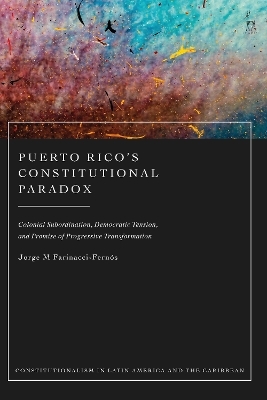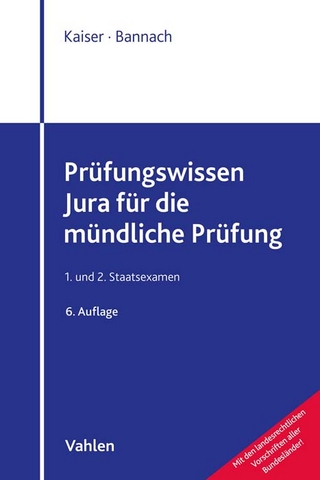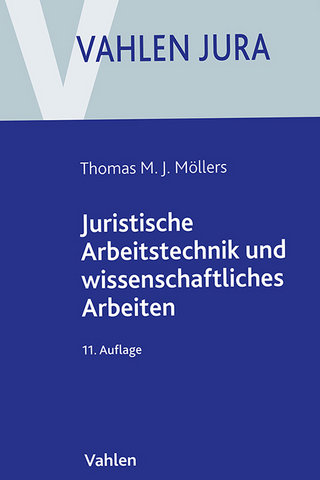
Puerto Rico’s Constitutional Paradox
Hart Publishing (Verlag)
978-1-5099-5350-9 (ISBN)
It looks in detail at the rich contradictions of the Puerto Rican constitutional experience, focusing on the history and content of the 1952 Constitution. This constitution is the only constitutional document written by the Puerto Rican People themselves after more than 500 years of Spanish and US colonialism.
By exploring Puerto Rico’s unique history and constitutional experience the book shines a spotlight on key emerging themes of comparative constitutional studies in this area: state constitutionalism, the persistence of colonial relationships in the Caribbean, and the continued development of constitutionalism in Latin America.
The book delves deep into the particular experience of Puerto Rican constitutionalism which combines elements of colonialism, democratic tensions, and progressive policies. It explains how these features converge in a constitutional project that has endured for 70 years and continues its contradictory development. It considers issues such as the island’s colonial history, including its conflicting relationship with democratic values and the constant presence of social movements and their struggles.
It also explores the content of the 1952 Constitution, focusing on its progressive substantive policy, particularly its rights provisions, its amendment procedures, and the governmental structure it set up.
Jorge M Farinacci-Fernós is Associate Professor at the School of Law, Inter American University of Puerto Rico.
1. Concepts and Structure
I. Overview
II. Constitutional Components
III. Conceptual Factors
IV. Integrated Analytical Structure
2. Puerto Rico before 1952
I. A History of Subordination and Authoritarian Antecedents: Spanish Colonialism and Early US Domination
II. Puerto Rico’s Territorial Status Prior to 1952
III. The Unfulfilled Potential of Puerto Rico’s Quest for Social Justice
3. The Constitutional Creation Process
I. In the Shadow of Colonialism
II. Democratic Mechanisms and Majoritarian Preferences
III. An Exercise in, Sometimes, Radical Politics
4. The 1952 Constitution (Structure)
I. A Colonial Constitution
II. The Direct Impact of Colonialism on the Political Structure and Amendment Mechanisms
III. Democratic Deficits: The Political Structure of the 1952 Constitution
IV. Amendment: Substantive and Procedural Limitations
5. The 1952 Constitution (Substance)
I. A Substantive, Progressive, and Social Constitution
II. Human Dignity, Equality, and Discrimination
III. Other Political Rights
IV. Criminal Procedure Guarantees
V. Socioeconomic Rights
VI. Section 19
VII. Other Substantive Policy Provisions
VIII. Congressional Anti-socialist Veto and Puerto Rican Colonial Acceptance
6. Puerto Rico under the 1952 Constitution
I. Introduction
II. A History of Judicial Underenforcement and Nominal Lip Service
III. The Illusion of Decolonisation, Autonomy, and Sort-of Equal Treatment
IV. Democratic Crisis: The New Two-party System, Political Repression, and Armed Struggle
7. Recent Developments Regarding the Puerto Rican Constitutional Project
I. Colonialism in the Twenty-first Century
II. The 1952 Constitution’s Internal Democratic Blind Spots Finally Emerge
III. The Constitution, Class Struggle, and Police Power During the Pandemic
IV. Final Thoughts
| Erscheinungsdatum | 16.08.2024 |
|---|---|
| Reihe/Serie | Constitutionalism in Latin America and the Caribbean |
| Verlagsort | Oxford |
| Sprache | englisch |
| Maße | 156 x 234 mm |
| Themenwelt | Recht / Steuern ► Allgemeines / Lexika |
| Recht / Steuern ► EU / Internationales Recht | |
| Recht / Steuern ► Öffentliches Recht | |
| ISBN-10 | 1-5099-5350-7 / 1509953507 |
| ISBN-13 | 978-1-5099-5350-9 / 9781509953509 |
| Zustand | Neuware |
| Informationen gemäß Produktsicherheitsverordnung (GPSR) | |
| Haben Sie eine Frage zum Produkt? |
aus dem Bereich


